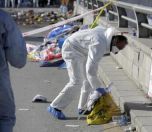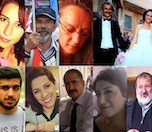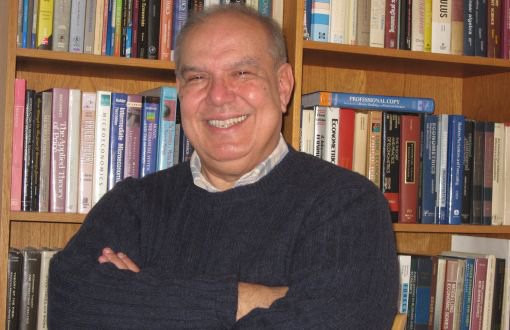Bianet talked to one of the founders of Diyarbakır Political and Social Research Institute (DİSA), Human Rights Foundation of Turkey’s (TİHV) Program of Overcoming the Social Trauma Coordinator, Dr. Necdet İpekyüz, about the social trauma following Ankara Massacre which left 97 people –according to the officials- dead.
Indicating people are shocked after these kinds of disasters and then shock gives way to anger, İpekyüz stated we should communize our pain not to allow that emotional shift turn into hate and revenge:
‘When you communize the pain, the anger gives way to the mourning.”
Bianet asked İpekyüz about the game in which Turkey beat Iceland with 1-0, fans booing the stand in silence staged for 97 people killed in Ankara chanted Allahu Akbar.
Ipekyüz answered it was a part of the social trauma:
“Why does this society know each other wrong and why does this hate grow? Who does contribute this hate speech?
“Sharing” or “Marginalization”?
We lived through Reyhanlı bombings, Diyarbakır and Suruç explosions and now Ankara… What kind of traumas are being observed among the society following these kinds of great disasters?
People are shocked by these kinds of disasters and these disasters make people angry, worried and hopeless. The actors of the society step in and you see the titles “sharing” or “marginalization”.
The anger diminishes when solidarity increases and the sorrow is shared and turns into mourning. If it doesn’t happen, desperation, hate and revenge increase.
Societies like Turkey have a potential of being polarized. When the pain isn’t commonized and the solidarity isn’t strengthened, people drift away from each other with hate and grudge.
“That football match in Konya was a part of social trauma”
Stand in silence for 97 people killed in Ankara bombing was staged prior to EURO 2016 qualifying game between Turkey National Football Team and Iceland National Team. As football players started to stand in silence, fans first whistled then chanted Allahu Akbar and shouted "Martyrs are immortal our land is indivisible". Does it result from the trauma has been built up over years?
It is a part of social trauma and it is very dangerous. We can’t ignore that. Reacting to it as if it is normal is abnormal.
“Why does this society know each other wrong and why does this hate grow? Who does contribute this hate speech? We should get to the bottom of it.
I mean, we should look at many years before.
Yes, if we don’t do that and don’t answer these questions, the polarization increases day by day.
“We prefer throwing disasters into our subconscious”
Do we forget these kinds of disasters or we unwittingly throw them into our subconscious? Reyhanlı bombing had been talked over but it was off the agenda when Suruç explosion occurred. And then Suruç was forgotten. How can you interpret it?
We usually prefer throwing disasters into our subconscious if we don’t face a really serious disaster.
However; burying, hiding and ignoring the disasters are jeopardous since you wouldn’t know when they break out again. That’s why, we should share the sorrow and develop coping skills.
We say in Turkey: “In joy and sorrow, we are together.” This togetherness fades away day by day. We don’t know what it evolves into.
“The fault ones leave carnations days after the disaster”
It was striking when New York Times captioned Deadly Ankara Attack Not Enough to Unify a Polarized Turkey. What can you say about the responsibilities of politicians?
Their responsibilities are huge. The ideal norm is that politicians gather people. However, when you look at Turkey you see politicians discriminating and consolidating their own party alignments.
It is attention grabbing that people can’t come together after a disaster took place at the hands of human actions. They easily and comfortably talk about the disaster after three or four days and they leave carnations for the dead.
For example, when a factory burns down, the boss is near his employees and workers if he has taken due precautions but if he is faulty about the fire, he visits the burnt down factory many days after.
Therefore, politicians should take on responsibility.
Moreover, politicians shouldn’t practice hate speech, they should use a common language sharing the sorrow.
“Politicians couldn’t manage the crisis”
Well, do you think politicians could get through these disasters?
I think they aren’t successful. The politicians and the government couldn’t manage the crisis. When you can’t manage the crisis resulted from acts of humans, you deepen it and you make the society more agitated.
“The society is anxious”
Does social trauma decrease the belief in justice?
Of course, it does. Mentioning justice and law is nonsense in Turkey. You see the examples when you look at the judicial process in the country.
When the traumas aren’t eliminated, the sense of justice belonging to the society is damaged. The society is anxious now because the justice isn’t administered.
“Psychological counseling of the state is only for show”
What should victims of the disaster do in order to overcome it?
We all lived through it and are badly affected by it as victims, victims’ families and casualties.
First degree relatives of the victims and casualties need major support. They need empathy, solidarity and their sorrows to be shared.
If they have serious problems –it would be surprising if they hadn’t-, they should seek professional help.
Speaking of professional help, psychological counseling requires huge amounts of money in our country. Does the state fund those who need help?
Psychological counseling of the state is only for show and leave people with their own problems. We, all of the society, should be educated about the man-made disasters via the media. (EKN/BD)
Click here to read the article in Turkish











.jpg)


